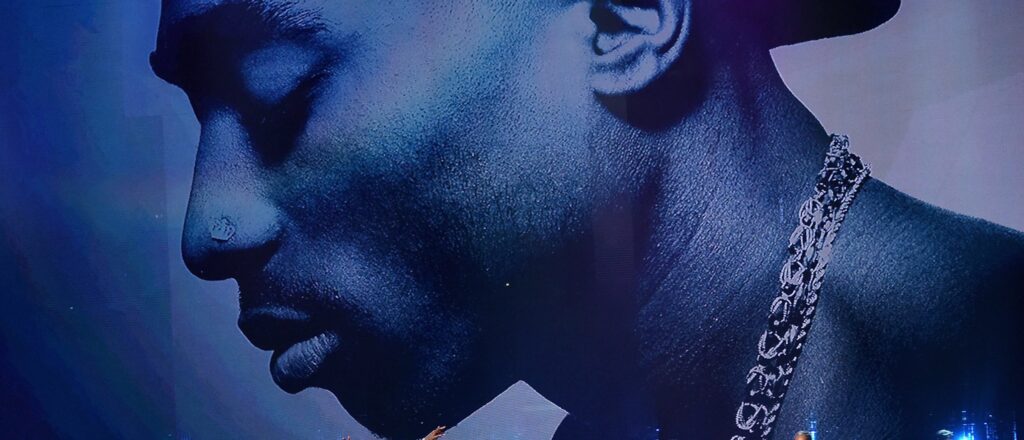Tupac Shakur, the Los Angeles rap artist who was murdered in 1996, finally received his star on the Hollywood Walk of Fame earlier this month.
It is the overdue acknowledgement that the glorification of violence, bitches, money, and drugs that originated in rap music really has won the day in American society. It is no longer confined to rap culture, but dominates all of the broader popular culture that we all consume everyday.
Tupac remains one of the best-selling rappers of all time, and is widely considered one of the most influential artists in the genre today. He shot to stardom after the release of his first album “2Pacalypse Now” which, as the son of a Black Panther radical, dealt with themes of black identity and police brutality that are ubiquitous in media today. Lyrics from the song “Trapped” read, “Tired of being trapped in this vicious cycle; If one more cop harasses me, I just might go psycho,” and reflect his view on the black experience. (RELATED: Tupac Shakur Gets Star On Hollywood Walk Of Fame)
Tupac Shakur receives his star on the Hollywood Walk of Fame ⭐️https://t.co/52WCdDsvQr pic.twitter.com/qTntTIzbmf
— HipHopDX (@HipHopDX) June 7, 2023
The lyric implies that an amorphous power structure is keeping black people down in America — that their treatment justifies a violent reaction. In other words, an early iteration of the Black Lives Matter slogan “No Justice, No Peace.”
As his success grew, later albums embraced the hedonism that comes with the life of the rich and famous, which was often reflected in vulgar lyrics. The song “How Do U Want It” includes lines like “All I want is money, fuck the fame” and “love the way you activate your hips and push your ass out . . . wantin’ it so bad I’m ’bout to pass out.”
Despite his stardom, his lyrics, as well as his actions, made him a highly controversial figure. He did more than just rap about killing cops, but actually was charged with shooting police officers. Feminists routinely critiqued the way he spoke about women, while then Vice President Dan Quayle criticized the harmful ways in which his music glorified violence.
Perhaps his most well-known critic was the feminist and civil rights activist C. DeLores Tucker. Tucker spent much of her youth marching with Martin Luther King Jr. and organizing for the Democratic Party. She also founded the MLK Association for Non-Violence and by the time she launched a “crusade” against violent “porno rap” in the 1990s, was the head of the National Political Congress of Black Women. Her mission led to a years-long string of lawsuits and counter-suits between the activist and Tupac’s record label, Death Row Records.
She spared no punches, shooting at the proponents of “gangsta rap” saying, “What do you think Dr. King would have to say about rappers calling black women bitches and whores? About rappers glorifying thugs and drug dealers and rapists? What kind of role models are those for young children living in the ghetto?”
Tucker is, of course, right — but her message has been largely forgotten. One could be forgiven for reading the lyrics above and failing to find offense. By today’s standards — on both vulgarity and political radicalism — they are by all measures quite tame.
We now live in an era where lewd and lascivious is the baseline, even the ideal. Children all over the country are taught pornographic curricula, while anyone who opposes it risks being deemed a “domestic terrorist” by the federal government. A song called “Pound Town” — where a woman named “Sexyy Red” raps about the color of her genitalia — is currently shooting up the Billboard Top 100 chart. Just last week, a surgically-altered man shook his bare, fake breasts on the White House lawn, part of an event where President Joe Biden honored the “bravest and most inspiring people I’ve ever known.” (RELATED: Screaming Trans Activist Removed From Event, Audience Responds With USA Chant)
On the sociopolitical front, Tupac’s once controversial message is now embraced at the highest levels of society. The American system and way of life is said to be so rife with racism that only a complete “systemic” overhaul can do. This idea is not only uncontroversial, but generally accepted.
It has broken out of the rap industry into the entire music and entertainment industry. Best-selling books have been written on it and make up required reading lists in schools and companies across the country. Any Fortune 500 company that does not commit itself to fighting systemic racism cannot expect to stay in business, and Biden has sought to re-shape the entire federal government around the pursuit of “racial equity.” (RELATED: American Medical Association Tells Black People To Ignore ‘Racist’ Health Indicators)
Tupac’s star on the Walk of Fame is an overdue acknowledgement of this reality. His antagonistic view of racial progress and hedonistic notion of the good life have won the day. They are not only the norm in the rap community, but all of American society.
In contrast, the original civil rights spirit of progress as incremental and dignified is no longer tolerated. Their traditional understanding of what makes up the good life — virtue, morality, duty —is now viewed as outmoded, backwards, perhaps even racist. That generation would certainly take issue with the complete overhaul of the American system, since it is through the founding principles that their cause ultimately resonated. Now, it is views like Tucker’s that are controversial, not Tupac’s. Today’s media would certainly brand her a “black face of white supremacy.”
It is also no wonder that rap outlets now brand Tucker as the “most-hated woman in hip-hop” while Tupac gets credited with having “changed hip-hop forever.” In reality, he did much more than that — his legacy is part of what changed America forever.


